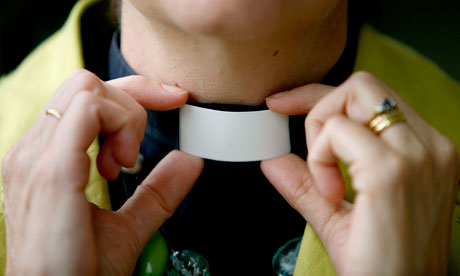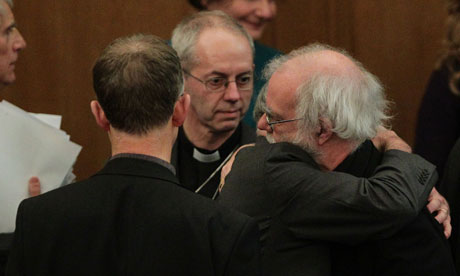 Evening everybody.
Evening everybody.
As some of you may be aware, the General Synod of the Church of England, for the past few days, has been deliberating on the issue of female bishops and whether or not to move forward and change Church legislation, allowing women to hold the role. In what some might consider a shock move, the Synod voted against the movement, loosing by a small minority in the House of Laity. I ask the question, is this failure of the Anglican Church to allow the ordination of female bishops, a step backwards, or is it in fact a leap in the right direction for the preservation of an age-old faith caught up in the constantly changing modern world?
Let me start if I may with the latter proposition: the refusal to change its [the Church’s] stance on female bishops is in fact a step in the right direction. At first, some of you may be thinking that I am a sexist, misogynistic, chauvinistic, patriarchal dinosaur who believes that women’s place is in the kitchen and not in professional roles. Well, you’d be completely wrong in this assumption but that does not deter from the fact that perhaps it’s a good thing that the Church is putting its foot down on something that it clearly feels so strongly about. Now, at this point I may have to feign ignorance and admit that I’m not 100% sure of what I’m about to suggest, but the Church bases its stance on female bishops on a passage from 1 Corinthians, which states that women should “remain silent in Church” (1 Cor 14:34). As suggested, I’m sure it’s more than that and as I don’t know enough about it I shan’t speculate as to what those other reasons might be for fear of getting it completely wrong, but let’s say for argument’s sake that it is this passage alone that contributes to the Church’s stance on this matter. Why should we expect the Church to change its mind on an issue that is clearly prohibited in its literature?
The Church is having an identity crisis. There have been episodes of people leaving the Anglican community as they feel it is straying too far from the traditional teachings of the Bible and of the originally intended catholic* Church. Christianity is founded on scripture, it is founded on the Church tradition dating back over 1500 years; if one is expectant of the Church to constantly evolve and change its views on certain issues, if one is demanding that the Church ‘modernise’ and sacrifice its integrity and original identity by conforming to secular norms and customs, what is left of the authentic tradition it started out as? Should we demand that the Girl Guides allow male members? Should we demand that male football teams be comprised of both sexes? The answer is no. The single-sex nature of the examples given is what characterises these groups. They have, for whatever reason chosen to be exclusive to a particular gender, so why are we asking the Church to change its predicates? If it were to manipulate something intrinsic, in that to change something that gives it its identity, would we be left with the Anglican Church? Just as if the Girl Guides suddenly accepted male members, would it be right to still identity them as the Girl Guides?
Maybe all major world faiths can take a leaf out of the Anglican’s book; they have refused to bend to the will of the modern world, the modern world which, so often in recent times, has criticised religion and has ostracised it to the privacy of one’s home. What bearing does the modern world have on an institution such as the Church? The Church could survive without having any direct link to the public stage, so it would have no need to conform to the customs and norms of the wider social playing field. Take France for example, an entirely secular nation where the practice of religion in public is illegal. If the Anglican Church were to have this debate in a French context, would there have been as high a demand for it to change its views? My instincts tell me not. Once religion and politics are separated then the two cannot hope and should not hope to have an effect on each other.
(*Catholic with a lower-case ‘c’ refers to a unified and universal Church, not the Roman Catholic church).
But that is where the problem lies with the question of female bishops in the Church of England. In our beautiful and glorious nation, religion and politics are intertwined with each other. Religion plays an active role in the political system of the United Kingdom, it is involved at the highest level of government and people are open about their faith (whatever it may be); the UK is a religious country…dare I be so bold as to say it is a Christian country?

If the Church of England wishes to continue such a relationship with the governing of the country that I love so dearly, then I’m afraid it has to update itself. It is obligated to be relevant, fair and unprejudiced in a society that boasts these qualities. In a recent study I conducted on the Roman Catholic Church in the United Kingdom, I found that the reason why Catholics are abandoning the idea of Papal authority in relation to issues such as abortion and birth control, is because of the fact that the teachings they [Catholics] are expected to adhere to are completely out-of-touch with the context they are attempting to govern. The same can be said of the Church of England; during the 1960s with the rise of the New Age and Hippie movements, Church attendance dropped and the rate of baptisms/confirmations also fell. These establishments were trying to teach old and archaic tricks to new, modern and liberal dogs who didn’t have the desire to learn, and so people became disillusioned and sought “self-spiritualities” as Paul Heelas calls them; based on the theosophical ideology that it matters not how you get there, but the goal of humanity is a higher spiritual self-awareness and any means by which one achieves this can be considered valid.
I’ve veered slightly off topic, but nonetheless I feel what has been highlighted in the last paragraph is relevant. Not only does the Church’s reluctance to modernise jeopardise its future relationship with British politics, but it also puts at risk its longevity. If people are continuing to become fed up of belonging to a seemingly archaic institution that is against homosexuality, against equal rights for women, are there going to be any people left in the Church? As is the task of liberal theology (or religious liberalism in any form), it is important to constantly ensure that the religion in question is current, in touch and ‘relatable’ so as to ensure that it remains to exist!
So yes, I believe it is a massive step backwards for the Church of England. Just when we though we might be getting somewhere in modernising religion, a blow such as this destroys any such hope. For the self-professed liberal tradition to cling on to an overtly conservative viewpoint, creates a huge question mark not only for me, but I’m certain for many liberal theologians and Anglicans alike. Where does this leave this Church then? Well, it’ll be another 7 years at least before the issue may be brought up again. So for now, we’re left with an institution that has cemented its conservativeness, an institution that still plays an active role in British politics. What does that say about British society? Even a nation as religious as the United States manages to keep its religious affairs out of the political spotlight; if the Church isn’t prepared to budge, should government make the move to oust bishops from the House of Lords? Perhaps. Let me end with the words of Dr Chris Maunder, head of the theology and religious studies program at York St John University, England:
No women bishops in the C of E. Sexist? Yes. Out of touch? Yes. Misguided? Yes. Supporting and encouraging the ministry of women? No. – Dr Chris Maunder
That’s all for now folks.

Naomi Hart liked this on Facebook.
so dissapointed in this decision
A battle between the Reactionary Conservative Theologians and the Radical Liberal Theologians is inevitable, this is your moment to shine Clarkey. For what it is worth, i actually agree with some of your views, if the C of E is part of the “establishment” then it should be expected to adhere to the same rules as the rest of the land, I also think that the establishment (which as you say, the C of E is part of) is (generally) a closed shop to most walks of life anyway. Nevermind eh.
Jessica Ingrid Carr liked this on Facebook.
RT @ClarkeRoberts: New blog post: A step backwards for the Church? http://t.co/BJuRYsJz #generalsynod #churchofengland #femalebishops